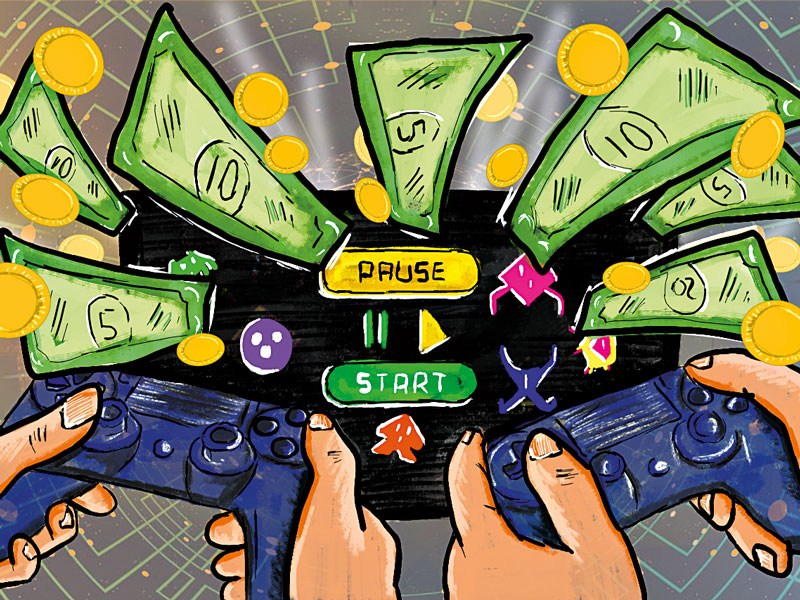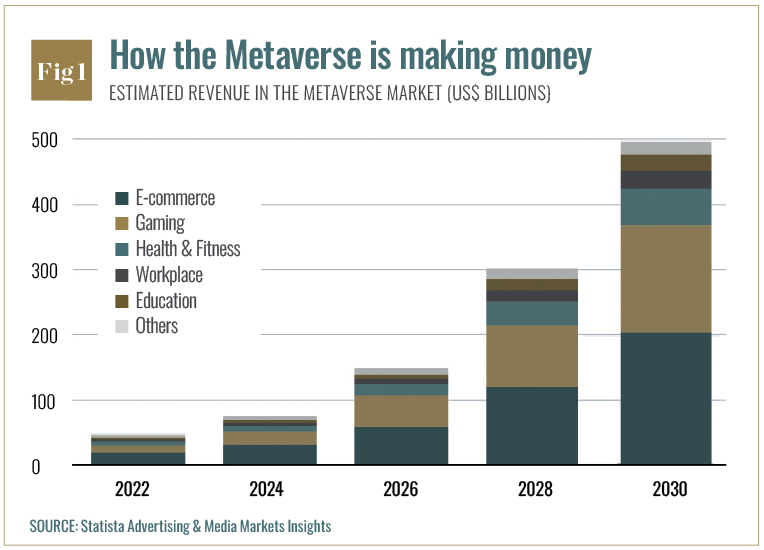
 
Author: Maryam Shahvaiz, Features Writer
Xbox and Playstation to the rise of mobile games and e-sports, gaming has become a significant part of people’s lives. The gaming industry, which includes the development of software, hardware, game development, e-sports and game streaming platforms, is evolving rapidly like any other mainstream industry in the world. Valued at around $300bn, the gaming industry has become a multi-billion-dollar industry, surpassing both the music and movie industry. The year 2024 was tough for many industries, mainly for two reasons: one is global economic instability and the other is the emergence of AI. However, the gaming industry proved resilient. It appears the owners of gaming studios know how to stay in the game. According to Deloitte’s 2024 Report, the gaming industry will reach a value of $485bn by the year 2028.
Financial strategy is playing a critical role in the success and growth of top gaming companies. Investors now understand that games are not just made for entertainment but it is a serious business that requires effective investment forecasts, well-planned business strategies and market adaptability. Therefore, game developers and producers across the globe are focusing on financial strategies that boost revenues without disrupting users’ gaming experience. These strategies are changing the canvas of conventional financial strategies and re-shaping business ideas about investment and long-term planning.
From entertainment to enterprise
Today, gaming companies place emphasis more on operating as a tech company rather than focusing merely on entertainment. Many are either investing in games development or launching their own games. They recognise that the gaming industry is now based on data, engagement and diversified revenue streams. Even Netflix, a well-known entertainment platform, has introduced a separate section for games, while Meta, which owns Facebook, Instagram and WhatsApp, has also launched different VR headset games.
Modern games earn money through in-app purchases, virtual rewards and optional ad-skipping
The primary aim of gaming companies has traditionally been to produce games that will stand the test of time and keep gamers coming back again and again, driving a continuous revenue stream over the years. Their monetisation strategies are now considered some of the most innovative in the digital world, as they continue to evolve and explore different revenue channels.
As a result, a conventional one-time purchase by gamers is now an old tale. Modern games earn money through in-app purchases, virtual rewards and optional ad-skipping. Subscription services and in-game video ads have also increased the revenues of video game producers.
Where play meets profit
Many of today’s games come with vibrant in-game virtual economies. Unlike other companies that follow traditional financial models, gaming companies emphasise diversified revenue streams. Diversification has enabled the gaming companies to shift their risks effectively.
Introduction of virtual assets and virtual currency is a part of that financial strategy. Gamers use virtual currencies to buy virtual items like tools, costumes and power-ups. This motivates players to purchase and sell in-game assets to improve their gaming experience and upgrade their gaming profile.
In many cases gamers spend real money to purchase virtual assets. While these virtual assets hold no real-world value, they can significantly enhance the gaming experience. Some games allow the players to sell their virtual assets, enabling gamers to earn profit from their in-game investments. This shift has removed the difference between digital and physical economies, creating a new economic model now being observed closely by many financial institutions and researchers.
In addition to that, earning from virtual purchases has become a major part of gaming companies’ revenues. This is a marked changed from traditional financial transactions that usually require formal agreements. So on one hand players are playing, socialising and engaging, but also using virtual currency to upgrade their gaming experience. Furthermore, virtual currency in games has also enabled gaming companies to enhance their CSR strategies.
A new economy
Apart from the birth and exploration of this digital economy, a parallel economy has taken investors by storm. NFTs and the Metaverse are the latest technological developments that are boosting the spread of virtual economies. NFTs allow gamers to own unique virtual assets, enabling them to develop new value chains in games. Moreover, the Metaverse is changing the gaming industry by implementing Virtual Reality (VR) and Augmented Reality (AR) and thus offering players a unique and therefore valuable gaming experience. According to a Statista report, the Metaverse market alone is expected to reach a market volume of $490bn by 2030 (see Fig 1).
There are many companies that are involved in the Metaverse and NFTs, and these NFT-based platforms are created to grab the attention of gamers. A few of the prominent ones include: Axie Infinity, Gods Unchained, The Sandbox, Meta(Facebook), Epic Games and Decentraland. These platforms allow players to invest in virtual assets, trade assets and characters that hold value in the real economy. This creates opportunities for both players and investors.
The rise of ETFs and gamification
As the gaming industry turns into a proper economic force, investors and entrepreneurs alike are responding by creating financial instruments like ETFs and experience-driven processes like gamification. However, developing new games and related technologies requires heavy investment and naturally comes with a degree of risk. The success of a new game hinges on its reception upon launch.
Gaming ETFs are quite similar to mutual funds and are spread across a variety of different companies. Some of the famous gaming ETFs are VanEck Video Gaming and eSports ETF (ESPO). When it comes to making financial decisions, ETFs are also easy to invest in because, unlike individual stocks, even a casual investor can evaluate which ETFs are better to invest in.
Additionally, gamification strategy is being adopted by various companies across the globe. Game mechanics are being included in some form within nearly every company’s app. Even the banks and trading apps now include game-like engagement features. The reason behind introducing these features is that it makes the whole process, that which was previously considered tedious, more fun and interesting. Gamification also helps new investors to understand stocks and investments. Apps like Robinhood offer simple features and rewards to assist users trading stocks, which is again quite similar to games rewarding gamers for levelling up.
Beyond finance, this strategy is adopted by food delivery services, online shopping apps and fitness apps. These apps offer a certain level of gaming experience. Even Temu, the popularity of which has skyrocketed, now offers in-app games to improve engagement and spending. The aim of this strategy is to engage their consumers to stick to their apps for a longer time because the longer the stay, the more likely they are to spend.
Apart from the gaming industry’s monetisation strategies, their social media strategy is also different from other industries. For gaming studios, this shift has changed the conventional gaming formats and given rise to social gaming platforms. Social platforms such as Discord and Steam have provided gaming companies a path to showcase their social media presence in a whole different way. It has transformed gaming into more of a social experience. Many online games like PUBG, Call of Duty and DOTA are not just focusing on games but also on building a gamer community. So for gamers, the game becomes not the only attraction; they also go to the platform to interact, share experiences and connect.
Now this is a paradigm shift for gaming studios because it enables them to not only promote their games but also increase players’ engagement, something previously unheard of in the first days of games consoles.
Today, some gamers do not see games as purely a hobby. For them it can also be a business opportunity and a potential way to earn a living. Developers are earning money by selling their games and in-game items, while players are monetising their skills by live streaming their video games on platforms like Twitch and YouTube. Both platforms allow a wide range of monetisation options, including subscriptions, Bits, live stream ad revenue and affiliate marketing. Through these avenues, the gaming industry is influencing individuals to act as digital entrepreneurs. It teaches players how to invest, save, exchange and develop items that can earn them money.
The future is playable
Gaming isn’t just changing entertainment; it is transforming mindsets about finance, investment and digital economies. The gaming industry has in fact helped to reshape financial strategy by incorporating a perfect combination of user engagement, innovation and technology.
From virtual currencies and NFTs to ETFs, and to the gamification of finance, the impact of the gaming industry has branched out to both players and investors. It has allowed players to become digital pioneers, investors and entrepreneurs, all while indulging in their favourite hobby.
Because of these developments, the financial strategies pioneered by the gaming industry are likely to become a blueprint for the next generation’s business models. As gaming continues to influence each and every industry, one thing is certain. The future of business will be more interactive, engaging and play-driven.